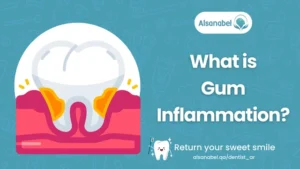
Gum inflammation is a common oral health concern that affects millions of people worldwide. It can cause discomfort, swelling, redness, and even bleeding, making everyday activities like eating and brushing painful. While gum inflammation is often associated with poor oral hygiene, several other factors can contribute to the condition.
Understanding the causes of gum inflammation is essential for effective prevention and treatment. Fortunately, there are various natural remedies and professional treatments for inflamed gums that can help soothe discomfort and restore gum health. In this article, we will explore the causes, symptoms, and the best ways to manage and prevent gum inflammation.
What is Gum Inflammation?
Gum inflammation, also known as gingival inflammation or gingivitis, occurs when the gums become swollen, red, and irritated due to bacterial buildup or other health factors. If left untreated, it can lead to more severe conditions like periodontitis, which affects the supporting structures of the teeth and can result in tooth loss.

Recognizing gum inflammation early allows for quick intervention, reducing the risk of complications and improving overall oral health.
Causes of Gum Inflammation
Many people wonder about the causes of gum inflammation and why their gums become swollen or irritated. Below are some of the most common reasons:
1. Poor Oral Hygiene
One of the leading causes of gum inflammation is inadequate oral hygiene. When plaque—a sticky film of bacteria—accumulates on the teeth and along the gumline, it triggers irritation and inflammation. Over time, this buildup can lead to gingivitis and, if not treated, more severe periodontal disease.
2. Gum Disease (Gingivitis and Periodontitis)
Gingivitis is the early stage of gum disease, characterized by mild inflammation, redness, and bleeding. If ignored, it can progress into periodontitis, a severe infection that damages the gums and jawbone. Periodontitis requires professional intervention to prevent tooth loss.
3. Smoking and Tobacco Use
Smoking weakens the immune system and reduces blood flow to the gums, making it harder for the body to fight infections. Tobacco users are more likely to develop inflamed gums, as their gum tissue is less resistant to bacterial infections.
4. Vitamin Deficiencies
Deficiencies in essential vitamins, particularly:
- Vitamin C – Important for collagen production and gum healing
- Vitamin K – Crucial for proper blood clotting and gum health
A lack of these vitamins can weaken gum tissues and make them more prone to inflammation.
5. Hormonal Changes
Hormonal fluctuations during pregnancy, menstruation, and menopause can make gums more sensitive and susceptible to swelling. Increased blood flow to the gums during these periods may lead to irritation, even with proper oral care.
6. Certain Medications
Some medications can contribute to gum inflammation by causing dry mouth or affecting gum tissue health. Common culprits include:
- Antihypertensive drugs
- Antidepressants
- Antiepileptic medications
- Immunosuppressants
If you experience gum swelling after starting a new medication, consult your doctor or dentist for possible alternatives.
7. Stress and Weakened Immune System
Chronic stress can negatively impact immune function, making it harder for the body to fight infections, including those affecting the gums. Stress may also lead to neglect of oral hygiene, further worsening gum inflammation.
8. Medical Conditions Related to Gum Inflammation
Certain systemic diseases can contribute to gum swelling and inflammation. These include:
- Diabetes – High blood sugar levels can impair circulation and gum tissue health.
- Leukemia – Blood disorders can affect the gums, leading to excessive swelling and bleeding.
- Autoimmune Disorders – Conditions like lupus and rheumatoid arthritis may increase gum sensitivity and inflammation.
If gum inflammation persists despite good oral hygiene, it may be necessary to investigate underlying health issues.
How to Reduce Gum Swelling: Natural and Professional Treatments
If you are wondering how to reduce gum swelling, there are several effective methods, ranging from home remedies to professional treatments.
1. Salt Water Rinse
A salt water rinse is one of the simplest and most effective treatments for inflamed gums. It helps reduce bacteria, soothe irritation, and promote healing.
How to use:
- Mix ½ teaspoon of salt in a cup of warm water.
- Swish in your mouth for 30 seconds, then spit it out.
- Repeat twice daily for best results.
2. Cold Compress
Applying a cold compress to the outside of the mouth can help reduce swelling and provide relief from discomfort.
How to use:
- Wrap an ice pack in a cloth and apply it to the cheek for 10-15 minutes.
- Repeat every few hours as needed.
3. Aloe Vera Gel
Aloe vera has natural anti-inflammatory and antibacterial properties, making it excellent for gum health.
How to use:
- Apply fresh aloe vera gel directly to your gums.
- Leave it on for 10 minutes, then rinse with water.
- Repeat twice daily.
4. Oil Pulling
Oil pulling with coconut or sesame oil helps remove harmful bacteria and improve gum health.
How to use:
- Take one tablespoon of oil and swish it around your mouth for 15-20 minutes.
- Spit it out, rinse with water, and brush your teeth.
- Repeat daily.
5. Hydrogen Peroxide Rinse
Hydrogen peroxide is a mild antiseptic that kills bacteria and reduces inflammation.
How does hydrogen peroxide help with gingivitis?
- It eliminates bacteria responsible for gum infections.
- It helps reduce plaque buildup.
- It promotes healing of gum tissues.
How to use:
- Mix equal parts of 3% hydrogen peroxide and water.
- Swish for 30 seconds, then spit it out.
- Use once daily to avoid irritation.
6. Professional Dental Treatments for Inflamed Gums
If home remedies do not provide relief, professional treatments may be necessary:
- Deep Teeth Cleaning (Scaling and Root Planing): Removes plaque and tartar from beneath the gums.
- Antibiotic Therapy: In cases of severe infection, dentists may prescribe antibiotics.
- Laser Gum Treatment: Helps eliminate bacteria and promote faster healing.
Frequently Asked Questions About Gum Inflammation

What is the fastest way to get rid of gingivitis at home?
The fastest way to reduce gingivitis at home is by combining salt water rinses, hydrogen peroxide rinses, oil pulling, and improving oral hygiene with regular brushing and flossing.
Can salt water rinse help gingivitis?
Yes, salt water rinses help reduce bacteria, soothe irritated gums, and promote healing, making them an effective remedy for gum inflammation.
What essential oils help with gingivitis?
Essential oils that help with gingivitis include:
- Tea tree oil – Antibacterial and anti-inflammatory.
- Clove oil – Pain-relieving and antimicrobial.
- Peppermint oil – Freshens breath and reduces bacterial growth.
How does hydrogen peroxide help with gingivitis?
Hydrogen peroxide helps kill bacteria, reduces plaque buildup, and promotes healing of inflamed gums.
What foods help heal gingivitis?
- Vitamin C-rich foods – Oranges, bell peppers, and strawberries.
- Leafy greens – Spinach, kale, and broccoli.
- Dairy products – Yogurt, cheese, and milk for calcium support.
- Nuts and seeds – Almonds, walnuts, and sunflower seeds for essential vitamins.
Gum inflammation is a common yet treatable condition that can be managed with proper oral hygiene, natural remedies, and professional care. Understanding the causes of gum inflammation and learning how to reduce gum swelling can help prevent further complications. By incorporating effective treatments for inflamed gums, individuals can maintain healthy gums and a strong smile. If symptoms persist, consulting a dentist is essential for long-term gum health.
%20(2).jpg)

